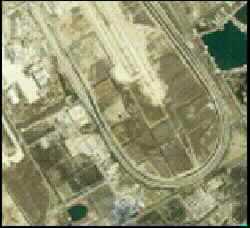Artillery fire sounded on Baghdad's southern fringes for the first time after US invasion forces advanced to the outskirts of the capital, but the Iraqi regime remained defiant as the war to oust President Saddam Hussein entered its third week.US troops were within 15 kilometers (nine miles) of downtown Baghdad and controlled the southern approaches to the capital, said Major General Buford Blount, commander of the 20,000-strong US 3rd infantry division.
At around around 8 pm (1700GMT), artillery fire was heard for the first time in the war on the southern outskirts of Baghdad, a part of which had been plunged into darkness following a cut in electricity, AFP correspondents in the Iraqi capital reported.
The barrage of pounding fire was heard heading southwards from the Iraqi line.
At US Central Command in Qatar, Major Randi Steffy said US troops were "outside the airport", which is 20 kilometres (12 miles) southwest of the centre of Baghdad.
But an AFP correspondent at Saddam International Airport outside Baghdad said Thursday afternoon that the airport was still under the full control of the Iraqi authorities.
"The airport is safe... Maybe the Americans occupied another airport in the desert," airport manager Muafiq Abdullah al-Jaburi told journalists escorted there by the information ministry.
Iraqi Information Minister Mohammed Said al-Sahhaf denied that US invasion forces were even at the gates of Baghdad.
They were "not even 100 miles" from the city and were trapped in combat with Iraqi troops in every major town, he said.
US President George W Bush, speaking to 20,000 marines and their families in North Carolina, pronounced that the days of Saddam's regime were "coming to an end".
Britain, Washington's key ally, said that the allied forces were now forging a strategic grip on Iraq .
The sustained offensive saw US ground troops move to within striking distance of the capital on different fronts, with twin assaults from the Third Infantry and the Marines closing in from the south and southeast.
Blount said his troops controlled a key intersection south of Baghdad after heavy fighting earlier Thursday and had blocked access to Baghdad from the south.
US Marines were meanwhile pushing cautiously towards Baghdad from the southeast. An AFP correspondent with the marines said they were in high spirits as they prepared for a decisive battle.
"We have accomplished every objective quickly and easily. I don't think it's a trap by the Republican Guard -- they're still trying to fight but they have no training, poor equipment and they're very sloppy," said one soldier.
At US central command in Qatar, Brigadier General Vincent Brooks said the Iraqi leadership appeared unable to control its forces and population throughout much of the country.
"We can't tell who's in charge. I don't think the Iraqi people know who's in charge. We have indications the Iraqi forces don't know who's in charge," he said.
As fighting continued to the south of Baghdad, the bombing of the capital continued, killing 27 civilians according to al-Sahhaf.
A hospital source said that in one incident, eight people were killed and five wounded when a missile hit a vegetable market on the edge of the city.
But Brooks insisted that every target hit by the allied forces in Baghdad during the bombing campaign had been military in nature.
The US casualty toll also continued to mount on Thursday, with US Central Command saying it was investigating reports of a fresh friendly fire incident involving US troops that left one soldier dead and several others injured.
A US Patriot missile may also have brought down a Navy F-18C Hornet fighter on a mission over central Iraq on Wednesday, US military authorities said.
Meanwhile, a US officer said that about 500 Iraqi troops were killed as US invasion forces pushed back an Iraqi bid to retake a key bridge over the Euphrates river about 30 kilometers (18 miles) southwest of Baghdad.
But despite their proximity to Baghdad, coalition political and military leaders remained cautious.
"There remains tough fighting ahead... We are not expecting to drive into Baghdad suddenly and seize it in a coup de main or anything like that," said Major General Stanley McChrystal, Joint Staff vice-director of operations in Washington.
British Defence Secretary Geoff Hoon warned lawmakers in London: "Do not underestimate the task that still faces our forces or the length of time that it may take to complete."
In northern Iraq, coalition air raids targeted Iraqi positions near the town of Khazer on the road to the key city of Mosul, an AFP correspondent reported.
The US invasion forces looming outside Baghdad launched early morning raids with precision guided munitions on Saddam Hussein's bunker, which its German architect says can withstand anything short of a hit by a Hiroshima size bomb.
Special forces also raided a palace used by Saddam 90 kilometres (60 miles) outside of Baghdad, capturing no regime officials but seizing documents.
There has been wide speculation in recent days on the Iraqi leader's fate and whereabouts. Western media have said Saddam may have been killed or wounded in an air strike at the start of the US-British military campaign.
In the south of Iraq, British invasion forces made little progress towards capturing Basra, advancing only one kilometre (less than a mile) into the southern half of the city, an AFP correspondent reported.
But officials said that the British invasion forces has no immediate plans to launch an all out offensive on the city, where 1,000 Iraqi militiamen were still holding out.
PHOTO CAPTION
U.S. invasion troops attacked Baghdad's international airport Thursday night after pushing through the outskirts of the capital.
- Author:
& News Agencies - Section:
WORLD HEADLINES


 Home
Home Discover Islam
Discover Islam Quran Recitations
Quran Recitations Lectures
Lectures
 Fatwa
Fatwa Articles
Articles Fiqh
Fiqh E-Books
E-Books Boys & Girls
Boys & Girls  Women
Women










